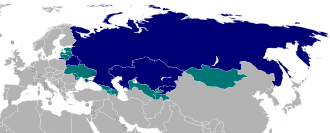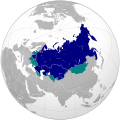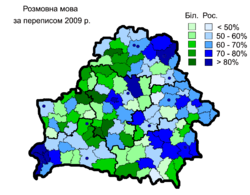Russian language
Russian (Russian: русский язык, transliteration: russkiy yaz'ik) is a Slavic language. It is the main language spoken in Russia. It is also spoken by many people in other parts of the former Soviet Union, such as in Ukraine, Belarus, Kazakhstan, Uzbekistan, Tajikistan, Kyrgyzstan, Moldova, Latvia, Lithuania, Turkmenistan and Estonia.
| Russian | ||
|---|---|---|
| russkiy yazyk русский язык[1] | ||
| Pronunciation | [ˈruskʲɪj jɪˈzɨk] ( | |
| Native to | Russia, Ukraine, Belarus and other neighbouring Post-Soviet states | |
| Native speakers | 150 million (2010)ne2010 260 million (L1 plus L2 speakers) (2012)[2] | |
| Language family | ||
| Early forms: | Old East Slavic
| |
| Writing system | Cyrillic (Russian alphabet) Russian Braille | |
| Official status | ||
| Official language in | ||
| Recognised minority language in | List
| |
| Regulated by | Russian Language Institute[15] at the Russian Academy of Sciences | |
| Language codes | ||
| ISO 639-1 | ru | |
| ISO 639-2 | rus | |
| ISO 639-3 | rus | |
| Linguasphere | 53-AAA-ea < 53-AAA-e (varieties: 53-AAA-eaa to 53-AAA-eat) | |
 Countries where Russian is an official language (dark blue) or spoken as a first or second language by greater than 30% of the population (teal) | ||
|
{{Infobox language/IPA}}
| ||
Russian, like other Slavic languages, is an Indo-European language. Russian is one of the three main East Slavic languages; the others are Ukrainian and Belarusian. More people speak Russian than any other Slavic language.
Written Russian does not use the Latin alphabet that English and the West Slavic languages do - some people do however, learn to write it in Latin letters. It mostly uses the Cyrillic alphabet, whose letters, like those of Latin, came from Greek, but are different from them. The other East Slavic languages and some of the South Slavic languages use the Cyrillic alphabet as well.
Russian is an official language of Russia, Belarus, Kazakhstan, Kyrgyzstan and Uzbekistan. It is one of the six official languages of the United Nations, along with English, Spanish, French, Arabic, and Chinese.
Standard Russian
Standard Russian is also called modern literary Russian (Современный русский литературный язык). It first appeared at the beginning of the 18th century. Peter the Great was then working to make the state more modern. Standard Russian grew out of the dialect of Russian that was spoken by people in and around Moscow. In some ways, Standard Russian was also like the Russian used in government offices in earlier centuries.
Mikhail Lomonosov wrote the first book on Russian grammar in 1755. The Russian Academy of Sciences published the first full dictionary of Russian in 1783. The grammar, vocabulary and pronunciation of Russian became stable and were standardized at the end of the 18th century and during the 19th century. That was called the "Golden Age" of Russian literature because it was a good period for the subject, which became very famous across the world.
All of Russia began to use Russian as the language of literature, education, and official communication. Until the 20th century, only the upper classes and people in cities spoke the literary language. Russians from the countryside continued to speak their local dialects. In the 20th century, all children were required to go to school. Many people had radios and televisions, which helped to spread Standard Russian. By the mid-20th century, Russian dialects had mostly disappeared. Standard Russian replaced them almost completely especially to talk to people from different oblasts.
Names
In Russian, a person's name has three parts: the first name, the second name and the family name.
Parents choose the first name for their child. Some common Russian names for boys are Ivan, Vladimir, Mikhail and Nikolai. Some common Russian names for girls are Anna, Anastasia, Svetlana and Yekaterina.
The second name is the patronymic (Russian: otchestvo) and comes from one's father's first name. For example, a boy whose father is Ivan would havae as patronymic is Ivanovich. If a boy's father is Nikolai, his patronymic is Nikolaevich. If a girl's father is Ivan, her patronymic is Ivanovna. If her father is Nikolai, her patronymic is Nikolaevna. The patronymic of a boy ends with -ovich or -evich. The patronymic of a girl ends with -ovna or -evna.
Boys have the same family name as their fathers. Girls use their father's family name but an -a is added to the end of the name. A man whose family name is Romanov would have a son with the family name Romanov and a daughter with the family name Romanova.
If a man's name is Nikolai Alexandrovich Romanov and has a son, Aleksei, and a daughter, Anastasia, the son's full name is Aleksei Nikolaevich Romanov, and the daughter's full name is Anastasia Nikolaevna Romanova.
There are also many people in Russia whose family names are not Russian. Some of the family names have only one form, which is the same for both sons and daughters. Some examples are Glushko (a Ukrainian name), Rubinstein (a German/Jewish name) or Shevardnadze (a Georgian name).
Grammar
Case
Like Latin, Greek, and German, Russian has a case system. In Russian, it applies to nouns, pronouns, adjectives, numerals and participles with a set of word endings (sounds/letters attached to the ends of words) that show the grammatical roles of words in a sentence. Because the grammatical roles are shown by the endings, word order is freer in than in English. There are six cases in Russian.
The nominative case, the form listed in the dictionary, is used for the subject of the sentence. The genitive case often shows ownership. The accusative case is used for a direct object, the dative case for an indirect object. The instrumental case is used for the tool or instrument with which something is done. The prepositional case is used after certain prepositions, such as "in" and "on", but other prepositions may require the use of other cases. Each case has other uses than those listed.
Gender and number
In Russian, nouns have one of three genders: masculine, feminine, or neutral. This is the same for languages like French, Spanish, etc. Masculine nouns usually end in consonants, neutral nouns usually end in -o or -e, and feminine nouns usually end in -a or -я. The plural acts like a fourth gender because gender does not change plural words.
Adjectives
In Russian, an adjective must agree with the word that it describes in gender, case and number. In the nominative case, adjectives that describe feminine words usually end in -ая or -яя. Those that describe masculine words usually end in -ый, -ий or -ой. Those that describe neuter words usually end in -ое or -ее. Those that describe plural words usually end in -ые or -ие. The endings change depending on case.
Russian Language Media
Languages spoken at home in Belarus (according to the 2009 Belarusian census) (green — Belarusian, blue — Russian) (by raion)
Percentage of Russian speakers in Estonia (according to the 2000 Estonian census)
Percentage of Russian speakers in different regions of Latvia (according to the 2011 census)
Percentage of people in Ukraine with Russian as their native language (according to the 2001 Ukrainian census)
A page from Azbuka (Alphabet book), the first East Slavic printed textbook. Printed by Ivan Fyodorov in 1574 in Lviv. This page features the Cyrillic script.
Russian vowel chart by Trofimov & Jones (1923:55)
This page from an "ABC" book printed in Moscow in 1694 shows the letter П.
References
- ↑ On the history of using "русский" ("russkij") and "российский" ("rossijskij") as the Russian adjectives denoting "Russian", see: Oleg Trubachyov. 2005. Русский – Российский. История, динамика, идеология двух атрибутов нации (pp 216–227). В поисках единства. Взгляд филолога на проблему истоков Руси., 2005. "РУССКИЙ - РОССИЙСКИЙ". Archived from the original on 2014-02-18. Retrieved 2014-01-25. . On the 1830s change in the Russian name of the Russian language and its causes, see: Tomasz Kamusella. 2012. The Change of the Name of the Russian Language in Russian from Rossiiskii to Russkii: Did Politics Have Anything to Do with It?(pp 73–96). Acta Slavica Iaponica. Vol 32, "The Change of the Name of the Russian Language in Russian from Rossiiskii to Russkii: Did Politics Have Anything to Do with It?" (PDF). Archived (PDF) from the original on 2013-05-18. Retrieved 2013-01-07.
- ↑ Russian language. Archived 2015-05-10 at the Wayback Machine University of Leicester. Retrieved 30 June 2014.
- ↑ "Article 68. Constitution of the Russian Federation". Constitution.ru. Archived from the original on 2013-06-06. Retrieved 2013-06-18.
- ↑ "Article 17. Constitution of the Republic of Belarus". President.gov.by. 1998-05-11. Archived from the original on 2007-05-02. Retrieved 2013-06-18.
- ↑ N. Nazarbaev (2005-12-04). "Article 7. Constitution of the Republic of Kazakhstan". Constcouncil.kz. Archived from the original on 2007-10-20. Retrieved 2013-06-18.
- ↑ (in Russian) Статья 10. Конституция Кыргызской Республики Archived 2012-12-22 at the Wayback Machine
- ↑ "Article 2. Constitution of Tajikistan". Unpan1.un.org. Archived from the original on 2017-05-25. Retrieved 2013-06-18.
- ↑ "Article 16. Legal code of Gagauzia (Gagauz-Yeri)". Gagauzia.md. 2008-08-05. Archived from the original on 2013-05-13. Retrieved 2013-06-18.
- ↑ 9.0 9.1 Abkhazia and South Ossetia are only partially recognized countries
- ↑ (in Russian) Статья 6. Конституция Республики Абхазия
- ↑ (in Russian) Статья 4. Конституция Республики Южная Осетия
- ↑ "Article 12. Constitution of the Pridnestrovskaia Moldavskaia Respublica". Mfa-pmr.org. Archived from the original on 2011-07-27. Retrieved 2013-06-18.
- ↑ Constitution and Fundamental Law of the Union of Soviet Socialist Republics, 1977: Section II, Chapter 6, Article 36
- ↑ "Charter of Organization for democracy and economic development – GUAM – GUAM". guam-organization.org. Archived from the original on 2016-03-05.
- ↑ "Russian Language Institute". Ruslang.ru. Archived from the original on 2010-07-19. Retrieved 2010-05-16.
- ↑ "Law "On Principles of State Language Policy", Article 7". Zakon2.rada.gov.ua. Archived from the original on 2013-06-16. Retrieved 2013-06-18.
- ↑ The Constitution of Ukraine. Article 10.
- ↑ The status of Crimea and of the city of Sevastopol is under dispute between Russia and Ukraine since March 2014; Ukraine and the majority of the international community consider Crimea to be an autonomous republic of Ukraine and Sevastopol to be one of Ukraine's cities with special status, whereas Russia, on the other hand, considers Crimea to be a federal subject of Russia and Sevastopol to be one of Russia's three federal cities.
- ↑ 19.0 19.1 Русский язык стал региональным в Севастополе, Донецкой и Запорожской обл.. 16 August 2012. Archived from the original on 18 August 2012. https://web.archive.org/web/20120818152652/http://top.rbc.ru/society/16/08/2012/664886.shtml. Retrieved 16 August 2012.
- ↑ "Русскому языку на Харьковщине предоставили статус регионального" Archived 2012-12-22 at the Wayback Machine. Ukrinform (in Russian)
- ↑ "Николаевский облсовет сделал русский язык региональным" Archived 2012-09-09 at the Wayback Machine. Новости Донбасса (in Russian)
- ↑ Одеська державна адміністрація (2013-06-01). "Про заходи щодо імплементації положень Закону України "Про засади державної мовної політики" на території Одеської області". Oblrada.odessa.gov.ua. Archived from the original on 2013-12-12. Retrieved 2013-06-18.
- ↑ 23.0 23.1 23.2 "List of declarations made with respect to treaty No. 148 (Status as of: 21/9/2011)". Council of Europe. Archived from the original on 2012-05-22. Retrieved 2012-05-22.
- ↑ "National Minorities Policy of the Government of the Czech Republic". Vlada.cz. Archived from the original on 2012-06-07. Retrieved 2012-05-22.
- ↑ Юрий Подпоренко (2001). "Бесправен, но востребован. Русский язык в Узбекистане". Дружба Народов. Archived from the original on 2016-05-13. Retrieved 2016-05-27.
- ↑ Шухрат Хуррамов (2015-09-11). "Почему русский язык нужен узбекам?". 365info.kz. Archived from the original on 2016-07-01. Retrieved 2016-05-27.
- ↑ Евгений Абдуллаев (2009). "Русский язык: жизнь после смерти. Язык, политика и общество в современном Узбекистане". Неприкосновенный запас. Archived from the original on 2016-06-23. Retrieved 2016-05-27.
- ↑ А. Е. Пьянов. "СТАТУС РУССКОГО ЯЗЫКА В СТРАНАХ СНГ". 2011. Archived from the original on 2016-05-28. Retrieved 2016-05-27.
Other websites
| This language has its own Wikipedia project. See the Russian language edition. |
![]() Media related to Russian language at Wikimedia Commons
Media related to Russian language at Wikimedia Commons








